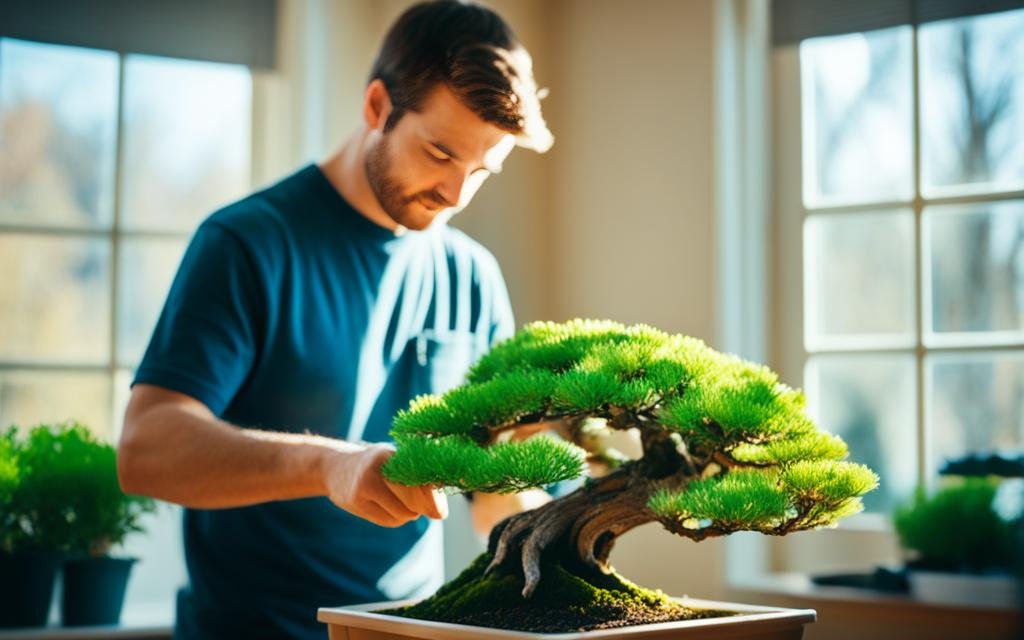I never thought a tiny tree could change my life. As someone with ADHD, finding focus was hard. Then I found bonsai, an ancient Japanese art that’s been around for centuries1. This careful plant care practice brought me a new world of mindfulness and focus.
Bonsai isn’t just about growing small trees. It’s about making living sculptures with careful pruning and shaping1. For those with ADHD, this process is a great way to use our energy and focus better. It’s like a meditation garden for your hands and mind, helping you find peace and reduce stress2.
Looking after a bonsai tree, whether it’s a delicate Japanese Red Maple or a sturdy Silver Birch, requires attention and care1. This regular care fits well with the ADHD brain’s need for engaging, rewarding tasks. It’s not just about growing a tree; it’s about growing patience, focus, and self-confidence.
Key Takeaways
- Bonsai cultivation can help manage ADHD symptoms
- Meticulous plant care promotes focus and mindfulness
- Regular bonsai maintenance aligns with ADHD brain needs
- Bonsai offers stress reduction and improved concentration
- The art form provides a rewarding, engaging activity
- Bonsai care can boost self-esteem and sense of accomplishment
Understanding ADHD and the Challenges of Daily Life
ADHD changes many parts of daily life. People with ADHD find it hard to handle tasks and duties. Let’s look at how ADHD affects executive function, building routines, and the need for fun activities.
One of the main challenges for individuals with ADHD is executive function. This refers to the ability to plan, organize, and prioritize tasks effectively. People with ADHD often struggle with impulsivity and may find it difficult to concentrate on one task at a time. This can lead to a constant feeling of being overwhelmed and disorganized, making it harder to keep up with work, school, or personal responsibilities.
Building routines can also be a major hurdle for those with ADHD. Consistency and structure are essential for managing daily life effectively. However, individuals with ADHD may find it hard to stick to schedules and follow through with planned activities. This can result in a sense of chaos and frustration, as they struggle to establish a routine that works for them.
However, despite the challenges, people with ADHD often excel in activities that capture their interest and provide a sense of focus. Bonsai, for example, can be a therapeutic practice for individuals with ADHD. The meticulous care required for nurturing and shaping these miniature trees demands attention and patience, allowing them to find a sense of focus through this activity. Bonsai and ADHD: Finding Focus Through Meticulous Plant Care can be an effective way to channel their energy and cultivate a sense of accomplishment.
Understanding ADHD and its impact on daily life is crucial for both individuals with ADHD and those around them. Recognizing the challenges faced in areas such as executive function, building routines, and engaging in enjoyable activities can help create strategies for better managing daily life. Whether it’s through finding alternative approaches to tasks, seeking support from professionals, or exploring hobbies like bonsai, it is important to find ways to navigate the challenges of ADHD and live a fulfilling life.
The Impact of ADHD on Executive Function
ADHD affects our ability to plan, focus, and finish tasks. This makes it hard to follow instructions or keep clean. Many find it tough to organize their thoughts and actions.
Struggles with Routine and Consistency
For those with ADHD, keeping routines is hard. Daily tasks can feel too much. Remembering appointments, paying bills on time, or keeping a clean house is a constant fight. These issues with consistency can cause frustration and doubt.
The Need for Engaging and Rewarding Activities
People with ADHD look for fun and rewarding activities to help manage their symptoms. Houseplants can be joyful but are hard to care for. Finding the right mix of fun and easy tasks is important. Activities that give quick feedback and show progress are great for ADHD brains.
One unique activity that can provide both engagement and rewards is caring for bonsai trees. Bonsai, with its meticulous plant care routine, offers a perfect outlet for individuals with ADHD to channel their energy and find focus. The art of bonsai involves shaping and nurturing miniature trees, requiring patience, attention to detail, and regular maintenance.
For individuals with ADHD, the process of tending to bonsai trees can be incredibly rewarding. It provides a sense of accomplishment as they witness the gradual growth and development of their plant. Bonsai trees require frequent pruning, wiring, and watering, which demand concentration and consistency. This structured routine can help individuals with ADHD develop discipline and the ability to stay focused on a task for an extended period.
Moreover, bonsai care can serve as a form of meditation and stress relief. The intricate nature of the work requires complete immersion, allowing individuals with ADHD to temporarily escape the distractions of the outside world. By focusing their attention on the precise trimming and shaping of each branch, they can experience a sense of calm and tranquility.
Engaging and rewarding activities are essential, especially for individuals with ADHD. Bonsai care offers a unique opportunity for individuals to find focus and joy. Its meticulous nature fosters discipline, patience, and attention to detail. By incorporating activities like bonsai into daily routines, individuals with ADHD can experience the benefits of engaging with nature and finding solace in the rewards of their own efforts.
| ADHD Challenge | Potential Solution |
|---|---|
| Executive Function Difficulties | Break tasks into smaller steps |
| Routine Struggles | Use visual reminders and alarms |
| Need for Engagement | Find hobbies with quick rewards |
Understanding these challenges helps us find ways to manage ADHD symptoms and improve daily life3.
Bonsai and ADHD: Finding Focus Through Meticulous Plant Care
Bonsai cultivation is a special way to engage the ADHD brain. It’s an ancient art that needs careful attention and patience. This makes it perfect for those wanting to improve focus and concentration.
The Mindful Nature of Bonsai Cultivation
Bonsai is an old Japanese practice. It’s about growing and shaping miniature trees in small pots. Popular trees include maples, junipers, and pines, each needing its own care1.
Every pruning decision shapes the tree’s future. It requires mindfulness.
In a fast-paced world where distractions are plentiful, finding moments of focus and tranquility can seem like a daunting task. However, for those who have discovered the art of cultivating bonsai trees, a unique opportunity presents itself. Bonsai is not just about gardening; it is a practice that promotes mindfulness and mental well-being.
Bonsai cultivation involves meticulously nurturing and shaping miniature trees in small pots. Popular species such as maples, junipers, and pines require careful attention and specific care techniques. This process of tending to a bonsai tree is far from mindless gardening; it demands constant awareness and focus on every delicate detail.
One might wonder, how does cultivating bonsai trees help individuals with ADHD find focus? The answer lies in the intentional and mindful approach it requires. The act of pruning each branch and shaping every leaf is a decision that directly impacts the tree’s future growth. It compels the cultivator to be present and connected to the task at hand, allowing no room for wandering thoughts or distractions.
Through the meticulous care of bonsai trees, individuals with ADHD can find solace and concentration in the minuscule details, honing their ability to focus on a singular task. As they observe the slow transformation of their bonsai tree under their attentive care, they learn patience and perseverance, qualities that are often challenging to cultivate in a fast-paced world.
In conclusion, cultivating bonsai trees offers a profound opportunity for individuals with ADHD to find focus and engage with the present moment. The careful attention to detail required in bonsai cultivation encourages mindfulness, allowing individuals to immerse themselves in the art and experience a sense of peace. Bonsai and ADHD: finding focus through meticulous plant care is a remarkable combination that yields not only beautiful and artistic results but also a fulfilling and mindful practice for those seeking a respite from the chaos of everyday life.
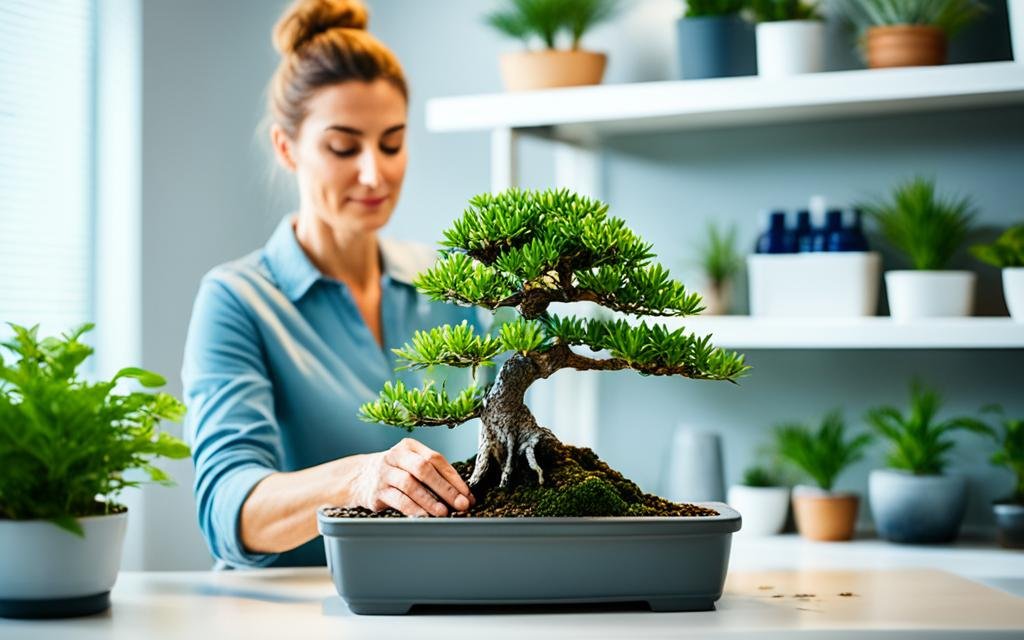
How Bonsai Care Aligns with ADHD Brains
The ADHD brain loves engaging activities, and bonsai fits the bill. It’s a structured yet creative outlet. Bonsai trees need little water and fertilizer but lots of sunlight and air1.
Building Patience and Concentration Through Bonsai
Caring for bonsai trees builds patience and concentration. The detailed pruning and shaping over time is rewarding for those seeking focus1. It can lower stress and boost mood, which is great for those with ADHD2.
| Bonsai Aspect | ADHD Benefit |
|---|---|
| Meticulous pruning | Improves focus |
| Long-term growth | Builds patience |
| Regular care routine | Enhances consistency |
| Creative shaping | Channels energy positively |
Creating a Bonsai Care Routine for ADHD Management
Starting a bonsai care routine can really help with ADHD. I begin with just one or two trees. A visual plant care schedule helps me remember to water, prune, and do other tasks. This keeps me on track and makes my daily life more consistent.
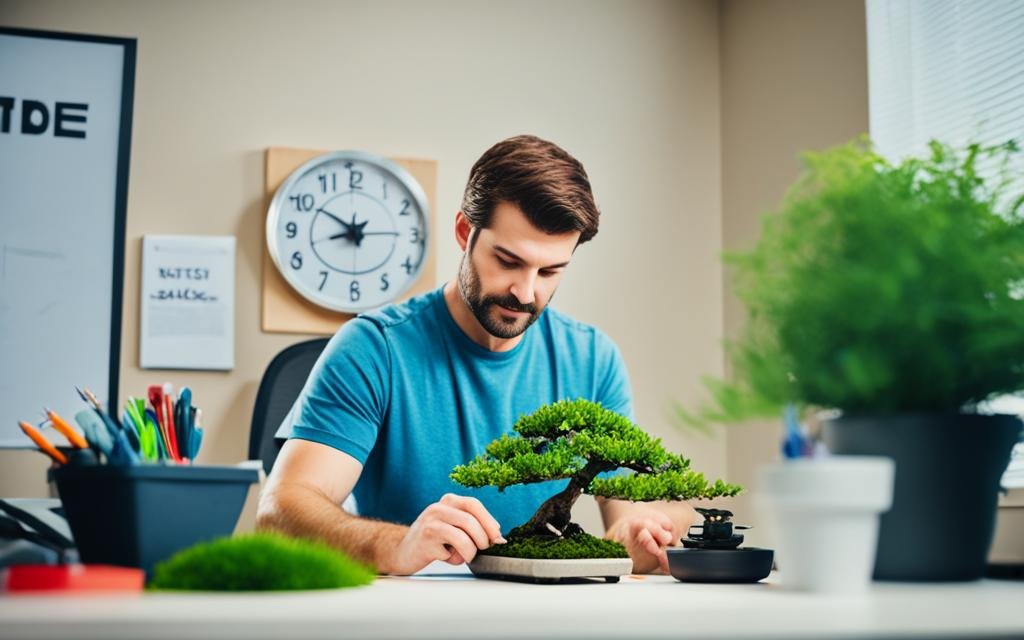
I start by picking the right tree for my bonsai care routine. The Japanese Red Maple is a great choice, with its beautiful colors from crimson to green1. The Silver Birch bonsai is another favorite, with its unique white bark1. These trees make my space look great and help me relax, which is key for managing ADHD.
Pairing bonsai care with other self-care activities makes my routine more effective. It helps me stay focused and builds good habits. When things don’t go as planned, I see it as a chance to learn and adjust my routine.
| Time | Task | ADHD Benefit |
|---|---|---|
| Morning | Check soil moisture | Builds routine |
| Midday | Prune if needed | Improves focus |
| Evening | Mist leaves | Reduces stress |
Studies show that being around green spaces can lower stress and anxiety4. Adding bonsai care to my daily routine has created a mini green oasis. This connection with nature boosts my focus and improves my mental health.
The Therapeutic Benefits of Bonsai for Mental Health
Bonsai cultivation is a unique way to improve mental wellness. It comes from ancient Japanese and Persian traditions. These traditions are known for their calming effects2.
Stress Reduction and Anxiety Management
Looking after bonsai can really help lower stress and make you feel better. The sounds and sights of these small gardens create a peaceful place. This helps clear your mind2. It’s like what “Psyched Up” suggests to reduce anxiety and gain confidence.
One unique way to reduce stress and manage anxiety is through the practice of caring for bonsai plants. Bonsai is an ancient Japanese art form that involves meticulously tending to miniature trees. The precise and delicate nature of bonsai care requires complete focus and attention, making it an excellent activity for those dealing with ADHD or a hyperactive mind.
Bonsai cultivation requires regular pruning, watering, and shaping of the plant, which not only promotes the health and growth of the tree but also encourages mindfulness and a sense of calm. As you spend time carefully tending to the intricate details of each bonsai tree, you become fully absorbed in the present moment, diverting attention away from anxious thoughts and worries.
Moreover, the serene ambiance created by bonsai plants can have a positive impact on the state of mind. The sound of water dripping, the gentle rustling of leaves, and the overall aesthetic appeal of these small gardens provide a peaceful atmosphere. This tranquil environment helps to clear the mind and promotes relaxation, offering an escape from the fast-paced and stressful modern world.
In addition to its stress-reducing qualities, bonsai care can also foster a sense of accomplishment and personal growth. Through the consistent nurturing of miniature trees, individuals can witness the progress and development of their plants over time. This process can instill feelings of pride, self-esteem, and purpose, which are essential components of overall well-being.
The art of bonsai offers a unique and rewarding approach to stress reduction and anxiety management. The combination of mindfulness, focus, and the therapeutic properties of tending to these miniature trees not only provides a reprieve from daily worries but also promotes personal growth and a sense of accomplishment. So, whether you have ADHD or simply want to find a calming hobby, consider exploring the world of bonsai and experience the incredible benefits it has to offer.
Improving Self-Esteem and Sense of Accomplishment
When bonsai grow well, it makes you feel proud. It’s like athletes getting ready for big events. Bonsai lovers create routines that make them feel better about themselves5. The careful attention needed is similar to what’s required in big challenges, building mental strength.
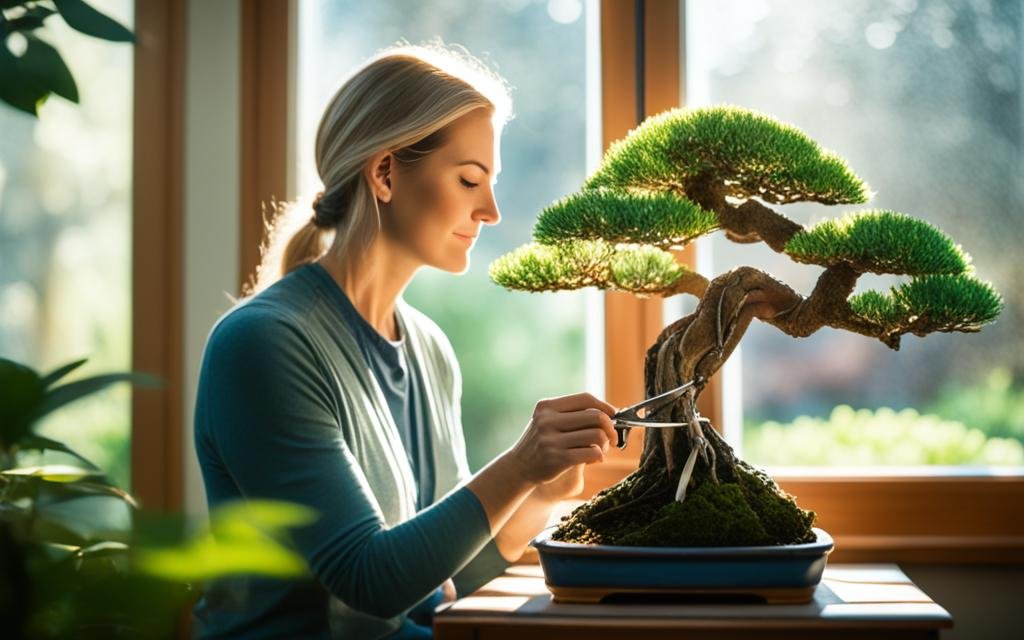
Fostering a Connection with Nature
Bonsai helps us feel closer to nature. This is especially important for city dwellers. The neat patterns in traditional gardens bring peace and balance, similar to bonsai care2.
| Therapeutic Benefit | Impact on Mental Health |
|---|---|
| Stress Reduction | Lowers cortisol levels, improves mood |
| Self-Esteem Boost | Builds confidence, sense of accomplishment |
| Nature Connection | Reduces urban stress, promotes calm |
Conclusion
Bonsai cultivation is a special way to handle ADHD. It needs focus and patience, which can be hard for people with ADHD6.
It makes you more mindful and connects you deeply with nature. This hobby lets you be creative and show your unique style through plant care therapy6. Pruning and shaping bonsai trees can be very calming and fulfilling.
Bonsai care is perfect for ADHD brains because it’s structured yet fun. Watching a Japanese Red Maple change colors or seeing a Cherry Blossom bonsai bloom can really catch your eye and make you wonder1. This beauty motivates you to keep caring for your bonsai, which helps you stay on track and focus better over time.
My experience with bonsai and ADHD shows it’s more than just a hobby. It’s a way to help manage ADHD symptoms, reduce stress, and boost self-confidence. By taking up bonsai cultivation, people with ADHD can find a fulfilling way to improve their lives.
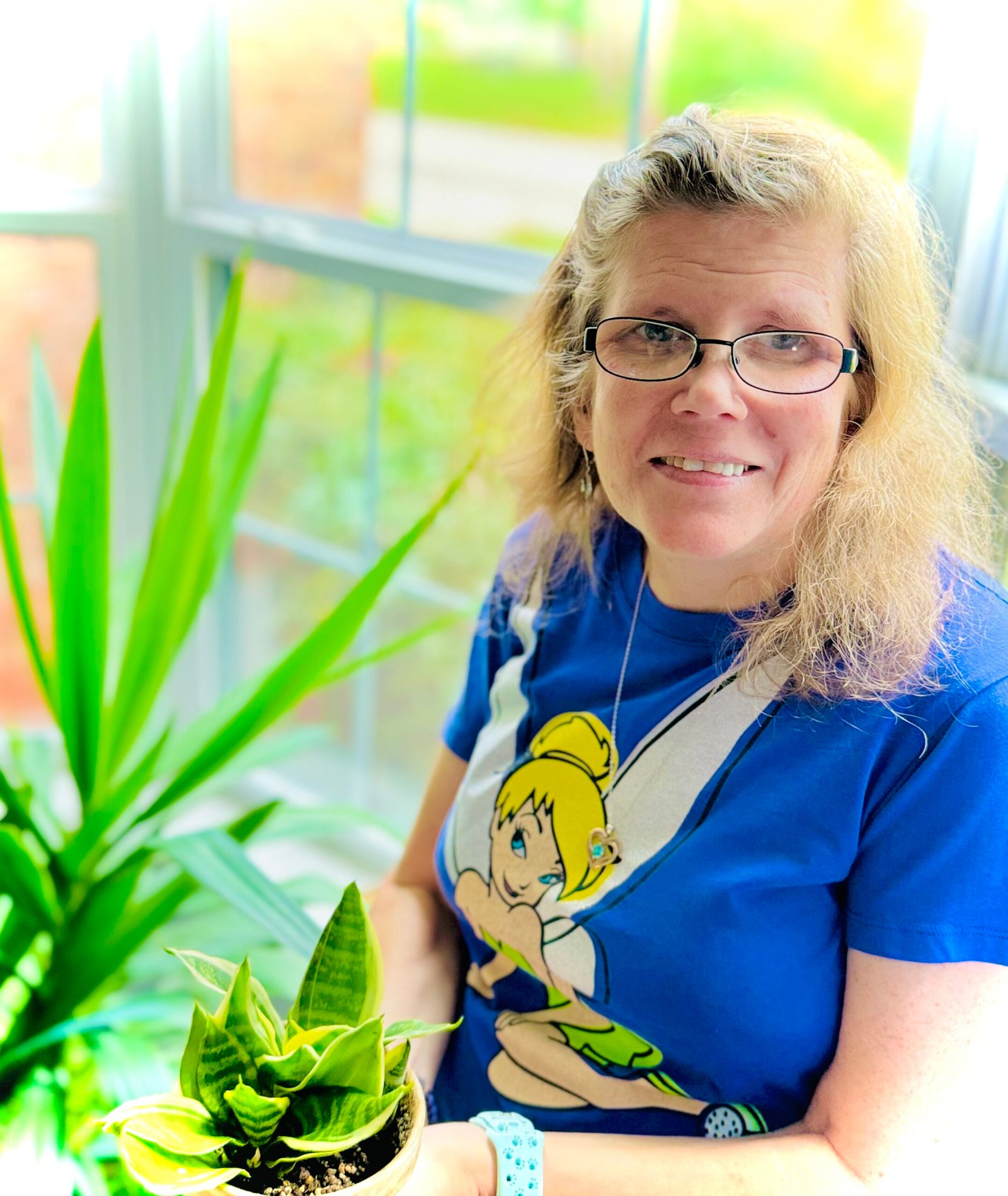
My name is Michelle Warren, and I’m the founder of Peaceful Gardening. As a 10-year breast cancer survivor, I’ve discovered the profound therapeutic power of gardening. This journey has not only helped me recover but has also become my passion and a source of ongoing peace and joy.
Peaceful Gardening was born from my desire to share the healing benefits of gardening with others. Whether you’re facing health challenges, dealing with stress, or simply looking to connect more deeply with nature, this space is for you.
Over the past decade, I’ve cultivated not just plants, but a deep understanding of how gardening can positively impact mental health. I’ve worked with local community gardens, led workshops on mindful gardening practices, and collaborated with mental health professionals to develop gardening-based stress reduction programs.
Peaceful Gardening was born from my desire to share the healing benefits of gardening with others. Whether you’re facing health challenges, dealing with stress, or simply looking to connect more deeply with nature, this space is for you.
Here, you’ll find evidence-based advice on using gardening as a tool for mindfulness, stress relief, and emotional healing. I share personal stories, practical tips, and scientifically-backed information on how to create your own therapeutic garden space, no matter the size of your yard or balcony.
My mission is to help you discover the joy, peace, and healing that comes from nurturing plants and connecting with nature. Join me in exploring how the simple act of tending to a garden can transform your mental and emotional wellbeing.
Welcome to Peaceful Gardening – let’s grow together towards better mental health!”

